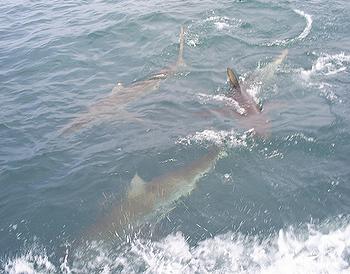No More Shark Fin Soup: Hawaii’s Shark Fin Ban Takes Effect
HONOLULU, Hawaii, June 30, 2010 (ENS) – Beginning July 1, it will be illegal to possess, sell or distribute shark fins in Hawaii, making the Pacific island state the first in the nation to enact a shark protection law.
Governor Linda Lingle, a Republican, on May 29 signed into law S.B. 2169, championed by State Senator Clayton Hee, a Democrat. The law closes an enforcement loophole which has allowed Hawaii to be the Pacific hub for the shark fin trade in Asia and beyond.
Senator Hee says killing sharks for their fins is like killing elephants for their ivory. He says Hawaii will set an example for the world, as some 89 million sharks are killed for their fins globally each year.
Under the new law, vessels that could once transfer, trans-ship and store tons of fins in Hawaii can no longer do so. The only exemptions in the new law apply to shark research and educational institutions holding permits issued by the Hawaii Department of Land and Natural Resources.
Today, local, national and international advocates for shark conservation gathered at the State Capitol in Honolulu to celebrate the historic shark protection measure.
Kelly Hu, Hawaii-born model, actress and ocean protection supporter, was present to commend Hawaii’s legislators and local advocates for their tremendous efforts on this unprecedented measure. Renowned Hawaiian artist Wyland and other conservationists sent congratulatory messages via Skype.
 |
Sharks off Oahu’s North Shore (Photo by Chris Austin, Jr.) |
Peter Knights, executive director of Wild Aid, shared public service announcements from basketball star Yao Ming and other celebrity advocates.
“With the enactment of this ban on shark finning, Hawaii has once again set an example for the rest of the country, if not the world, to follow,” said Inga Gibson, Hawaii state director for The Humane Society of the United States.
Shark finning involves cutting off the fins of sharks then throwing them back into the ocean, often while still alive. Millions of sharks are killed each year to supply the demand for shark fin soup, a Chinese delicacy.
Shark fins are prized for their slippery and glutinous texture that results in a thickened soup that is regarded as a tonic food and an aphrodisiac. The Chinese believe shark fin soup strengthens the internal organs and retards aging.
Under the new law, restaurants holding fins prepared for consumption and possessing a permit issued by the Hawaii Department of Health, as of July 1 have one year to sell, remove or dispose of any shark fin inventory, including shark fin soup. Restaurants or retailers not in possession of such a permit by July 1 will be in violation of the law.
But environmentalists and biologists agree that shark populations cannot sustain current slaughter rates, which have brought some species of shark to the brink of extinction.
One reason why people shrink from shark protection legislation is due to fear of sharks. The rate of shark attacks in Hawaii remains steady at about three per year, usually perpetrated by tiger sharks, which eat human-sized prey. From 1882 to October 2009 there have been 114 total unprovoked shark attacks in Hawaii. Eleven of these were fatal attacks, the last in 2004.
Without knowing it, thousands of people in Hawaii come into close contact with sharks each year while swimming, surfing, and boating, says Hawaii Shark Encounters, a tour company that takes guests to see sharks in the wild off Oahu’s North Shore from the safety of a cage.
“One of our main goals at Hawaii Shark Encounters is to support and further the cause of shark conservation,” says the company website. “The demise of the shark populations is a global issue that needs our immediate attention and action. Support for shark protection is difficult to achieve because of the persistent irrational fear of sharks. A change in attitude, perception, media coverage, and improved conservation legislation and fishing policies are desperately needed. For that purpose we have founded Shark Allies, a nonprofit organization that will make every effort to achieve those goals.”
“We hope that Hawaii’s bill will inspire a move for immediate and strong legislation in other U.S. states and Pacific Island Nations,” said Stefanie Brendl, founder and director of the Hawaii-based nonprofit Shark Allies. “Hawaii has shown the world that this can be done, and there is absolutely no reason why it shouldn’t be replicated across the globe.”
Alongside the fear of sharks, exists respect and appreciation. “Some families, believe that the spirit of an ancestor could appear as a shark, perhaps to chase fish into their nets, or to guide a lost canoe to safety,” writes Herb Kawainui Kane, an author and artist-historian with special interest in Hawaii and the South Pacific.
“For these families, the killing or eating of any shark was an act of filial disrespect,” writes Kane.
The U.S. Congress is currently considering the Shark Conservation Act, introduced by Democrats Representative Madeleine Bordallo of Guam in the House, where it has been approved, and by Senator John Kerry of Massachusetts in the Senate.
The national law would close critical loopholes in the federal law to improve enforcement, such as requiring boats to land sharks with their fins still attached. If enacted, it would strengthen Hawaii’s new shark fin law.
Copyright Environment News Service (ENS) 2010. All rights reserved.
© 2010 – 2012, Environment News Service. All rights reserved. Content may be quoted only with proper attribution and a direct link to the original article. Full reproduction is prohibited.
